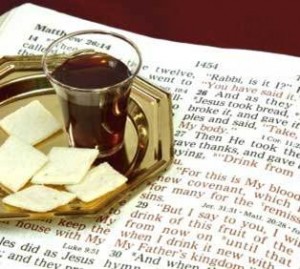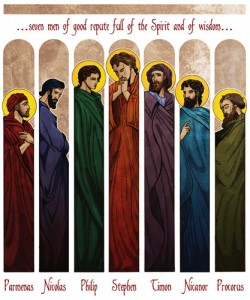 A monthly, quarterly, or simply “infrequent” observance of the Lord’s Supper (or in some traditions “the Eucharist,” “Communion,” or “the Lord’s Table”) has become generally accepted by many churches. So common is the non-weekly observance that when Bible-believing Christians are confronted with the fact that the earliest churches observed the Lord’s Supper weekly, as instituted by Christ and the apostles, they respond with disbelief, defensiveness, or even resentment. Countless excuses spill from their lips as to why they can’t (or won’t) conform their Sunday worship to the original apostolic model presented in the Bible and clearly seen in the earliest churches founded by the apostles.
A monthly, quarterly, or simply “infrequent” observance of the Lord’s Supper (or in some traditions “the Eucharist,” “Communion,” or “the Lord’s Table”) has become generally accepted by many churches. So common is the non-weekly observance that when Bible-believing Christians are confronted with the fact that the earliest churches observed the Lord’s Supper weekly, as instituted by Christ and the apostles, they respond with disbelief, defensiveness, or even resentment. Countless excuses spill from their lips as to why they can’t (or won’t) conform their Sunday worship to the original apostolic model presented in the Bible and clearly seen in the earliest churches founded by the apostles.
Frankly, a lot of confusion, misinformation, bad preaching, and bad teaching have permeated our understanding of the Lord’s Supper. Therefore, it’s necessary to revisit the biblical, historical, and theological facts confirming that a weekly observance of the Lord’s Supper in the context of the local church’s Sunday worship was the original apostolic practice to be observed in all churches since—including yours and mine. I know this essay is long, and at points it can become somewhat technical. But I promise it will be worth your diligence.
Coming Together around the Bread and Cup
Let me begin by setting forth the simple establishment of the Communion service ordained by Christ at the completion of the Last Supper. Though the meal preceding its establishment was a typical Passover Seder, the institution of the bread and wine as the body and blood was a radical modification of the Passover tradition. Christ first “gave thanks” for both the cup and the bread (Matt. 26:26–27; Mark 14:22–23; Luke 22:17–19). The Greek verb “to give thanks” is eucharisteo, the noun form of which is eucharistia. This is the term used in the early church for the Communion service of bread and wine—the “thanksgiving” or Eucharistic observance.
Christ also identified the broken bread with his body and the cup of wine with his blood (Matt. 26:26–28). This is clearly a completely new revelation, not an expected part of the Jewish Passover observance. Therefore, Jesus’s words, “Do this in remembrance of me” (Luke 22:19; 1 Cor. 11:24) refers exclusively to the institution of the bread and wine. In fact, Paul himself narrows the observance to the consecrated bread and wine when he says, “For as often as you eat this bread and drink the cup, you proclaim the Lord’s death until he comes” (1 Cor. 11:26). That is, the proclamation, remembrance, and observance are all focused on the bread and wine, not the entire Passover meal.
Of course, neither Jesus nor Paul clearly said anything at this point about the frequency of the observance of the Communion service. Paul used the ambiguous term, “as often as” (1 Cor. 11:25–26). However, this term does not mean “do it whenever you want.” Clearly the Corinthian church already had a set pattern of observing the Lord’s Supper. Paul was therefore building upon that understanding of the frequency of the observance while reminding them that as frequently as they observe Communion, they are proclaiming the Lord’s death. The emphasis was on remembering the purpose of the observance every time they participate in it, not on observing the Lord’s Supper whenever they felt like it.
So, is there a way for us to determine what the apostles actually established as the normative practice of the Lord’s Supper?
In 1 Corinthians 11, Paul points out that when the Christians in Corinth “come together,” problems arise (11:17). Paul uses the term “come together,” sunerchomai, in this passage as a term for the official assembling of the local church in Corinth. In verse 18 he says, “When you come together as a church, I hear that there are divisions among you.” Also, 1 Cor. 14:26 uses the same term for the official gathered meeting of the church. This confirms that Paul had in mind the weekly gathering of the community to observe the practices he had established during his eighteen-month period of teaching the new Christians several years earlier. Though they had maintained the weekly practice of gathering together as a church, the meeting had become fraught with problems.
When did this gathering together of the church occur? Well, 1 Corinthians 16:1 says, “On the first day of every week, each of you is to put something aside and store it up.” The idea is that each believer is to contribute something of his or her wealth to a community pot that would later be collected when Paul arrived. The “first day of every week” is, of course, Sunday. The book of Acts also notes that the church of Troas gathered “on the first day of the week . . . to break bread” (Act 20:7). In fact, Paul stayed a full seven days in Troas after his arrival there in order to remain with the disciples during that Sunday. No other day would do.
In any case, the weekly gathering, having been firmly fixed in Judaism as Saturday, naturally continued in the early church, but with an important change. The earliest Christians commemorated the resurrection of Jesus, which occurred on “the first day,” Sunday (Matt 28:1; Mark 16:2; Luke 24:1; John 20:1). That this was the pattern established by the apostles themselves when they planted their churches is confirmed in the first century historical document from the church in Antioch, which instructs new churches, “Every Lord’s day, gather yourselves together, and break bread, and give thanksgiving after having confessed your transgressions” (Didache 14.1). So early is the Didache (dated by modern Didache scholars now between A.D. 50 and 70) that it gives us a window into the actual practice of the churches established by the apostles themselves. It’s not surprising that we find Ignatius of Antioch some years later faithfully carrying out the instructions of the apostles. He notes that those who have come to Christ from Judaism are “no longer observing the Sabbath, but living in the observance of the Lord’s day, on which also our life has sprung up again by Him and by His death” (Ignatius, Magnesians 9.1).
Therefore we see that our reading of the New Testament documents concerning Sunday worship (the Lord’s day, on which He was raised from the dead, not Saturday), is confirmed by the historical documents that relay the actual practices of the early church. (For more information on Sunday as the original day of Christian worship, see my essay, “Putting the Sabbath to Rest.”)
What were the churches expected to do when they “came together” (sunerchomai) each Sunday? Returning to 1 Corinthians, we see that in conjunction with the “coming together,” they were to celebrate the unity of the body by observing “the Lord’s supper” (1 Cor. 11:17–20)—a mark of unity at which they were utterly failing (11:21). That this “Lord’s supper” was not a fellowship meal is confirmed by the fact that Paul explicitly instructs those with means to “eat at home” (11:34; cf. 11:22). Rather, the “Lord’s supper” observed in the weekly coming together was that observance instituted by Christ “on the night when he was betrayed” (11:23).
Was the Lord’s Supper Just a Passover Meal?
Though some have closely tied the institution of the Lord’s Supper to the annual Jewish Passover meal, such a perspective fails to hold up to biblical, theological, and historical scrutiny. Already in 1 Corinthians Paul makes a point that “after supper” Jesus took the cup (1 Cor. 11:25). The Passover supper itself was over. What Jesus instituted came afterwards, was detached from the traditional Passover meal, and involved words and actions that were not part of any traditional Passover Seder. Renowned early church scholar, Everett Fergusson, writes of the account of the institution of the Lord’s Supper in the Gospels: “Mark and Matthew make nothing of the meal setting, except to mention it as the occasion when Jesus gave a special meaning to the bread and the cup. They focus attention on what was important for the continuing practice of the church” (“Lord’s Supper and Love Feast,” Christian Studies 21 [2005–2006]: 28).
Theologically, Christ uses the bread and the cup to point us to the New Covenant. In stark contrast, the Passover meal was an annual hallmark of the Old Covenant. In fact, in the key New Covenant passage in Jeremiah 31, the prophet proclaimed, “Behold, the days are coming, declares the LORD, when I will make a new covenant with the house of Israel and the house of Judah, not like the covenant that I made with their fathers on the day when I took them by the hand to bring them out of the land of Egypt” (Jer. 31:31–32 ESV). The mark of remembering the institution of the Old Covenant (redemption from Egypt) was the annual Passover celebration. The mark of remembering the institution of the New Covenant (redemption in Christ’s blood) is the weekly Lord’s Supper, remembering Christ’s incarnation, death, and resurrection each week as a reflection that Christ has not yet returned (1 Cor. 11:26).
Thus, the difference between Passover and the Lord’s Supper is as different as the Old Covenant and the New Covenant, as different as circumcision and baptism. This is why Paul put the Old Covenant Jewish observances in proper perspective in Colossians 2:16–17—“Therefore let no one pass judgment on you in questions of food and drink, or with regard to a festival or a new moon or a Sabbath. These are a shadow of the things to come, but the substance belongs to Christ” (ESV). These shadows of things to come (including the Passover, cf. 1 Cor. 5:7) must never be confused with the realities of Christ’s person and work—remembered through the weekly celebration of the bread and cup.
Was the Lord’s Supper the “Love Feast”?
The “love feast” is mentioned only once in the New Testament (Jude 1:12), paralleled in 2 Peter 2:13 with reference to a “feast.” Too often the “love feast” has been understood by modern readers as a “fellowship meal,” like a church potluck, Sunday school picnic, or some other time of “food, folks, and fun.” But the “love feast” held by many in the early church was actually a “charity meal” primarily for the purpose of providing sustenance for the needy members of the congregation—widows, orphans, and the poor. Its inspiration did not come from the Last Supper, but perhaps from the Lord’s miraculous feeding of the hungry in Matt. 14:19 and the early church’s practice of providing for the needy through the voluntary benevolence of the rich (Acts 4:34–35). In some places the love feast was supplemented with or supplanted by a monetary or food offering intended to provide for the poor and needy. On the other hand, the Lord’s Supper was an observance distinct from the love feast. In the Lord’s Supper, bread and wine were ceremonially consumed as a memorial confession of Christ’s person and work, a medium of spiritual fellowship with Christ himself, and a means of covenant renewal among the local church community.
Everett Fergusson writes, “The Lord’s supper and the love feast were two distinct activities—the one a remembrance and proclamation of the death and resurrection of Jesus and the other an act of benevolence and fellowship. It took some time before a distinct and fixed terminology prevailed, even as some time passed before the functions were separated in time, but the activities themselves had discreet meanings from the beginning” (Fergusson, “Lord’s Supper and Love Feast,” 35). Similarly, Marcel Metzger, an expert on the history of Christian worship, writes concerning the charity meals, “The community meals were at once a realization and an expression of charity and mutual support, another aspect of communion in one single body. In times of want and famine . . . the demands of mutual help led in all likelihood to the organization of daily meals for the benefit of the needy” (Marcel Metzger, History of the Liturgy: Three Major Stages, trans. Madeleine M. Beaumont [Collegeville, MN: Liturgical Press, 1997], 21–22).
Simply put, the “love feast” is not the same as the Lord’s Supper. Neither is the love feast simply a fellowship meal, like our modern potlucks, or any meal we have with other believers. Rather, when we read the Bible in its historical-theological context, it becomes clear that the “charity meal” was often observed in conjunction with the gathered community as a way for the well-off to provide for the needy. Thus, the modern equivalent of the “charity meal” in our churches is not the Lord’s Supper, a potluck, or a church-wide picnic, but a benevolence offering for the poor.
Was the Lord’s Supper Any “Breaking of Bread” with Believers?
Some time ago a young man contacted me with concerns over his church’s apparent teaching and practice of the Lord’s Supper. He reported that the pastor of the church taught that the biblical Lord’s Supper was never intended to hold a special place in church worship. Rather, the Lord’s Supper, he said, was any meal that believers enjoy together. In fact, that pastor boldly asserted that the traditional in-church observance of the Lord’s Supper was a “bastardization” of its original intent (these are his words, not mine!). And he added that he partook of the Lord’s Supper three times a day—whenever he “broke bread” with fellow believers at breakfast, lunch, or dinner!
Sadly, this confusion occurs far too frequently among careless Bible-readers who fail to read the Scriptures in their literary and historical context. The idiom “to break bread” is already used in the Old Testament. In Isaiah 58:7 and Jeremiah 16:7 the authors use the Hebrew word parash, “to divide,” in the sense of “sharing” food with the needy and the mourning. The Septuagint (the pre-Christian Greek translation of the Hebrew Scriptures) renders the idiom in Jeremiah 16:7 as “break bread.” By the New Testament, the practice of “breaking bread” in conjunction with a blessing at the beginning of a meal was customary in Judaism, often in the context of “dividing” one’s supply of food with others (Matt. 14:19; 15:36). Thus, when Jesus instituted Communion after the Last Supper, we are told that he “took bread, and after blessing it broke it.”
Everett Fergusson clarifies: “The phrase, ‘break bread,’ referring to a general custom, could refer to beginning a meal or to the specific remembrance of the death of Jesus. The context must decide which is meant in each case” (Fergusson, “Lord’s Supper and Love Feast,” 30). Many careless readers of Scripture (some who should know better!) have read the term “to break bread” as if a) it always means the Lord’s Supper, or b) it always means any meal with others, or c) it has both meanings, so it is a meal with others, which is the Lord’s Supper. This latter error—of which the pastor mentioned earlier was guilty—is akin to the exegetical fallacy D. A. Carson calls “Unwarranted adoption of an expanded semantic field” (Exegetical Fallacies, 2d ed. [Grand Rapids: Baker, 1996], 60–61).
The context of each passage must determine the kind of “breaking bread” involved. When Paul was on his way to Rome by ship and he broke bread with others on the vessel (Acts 27:35–36), this was a normal meal; it does not indicate that Paul shared the church’s Lord’s Supper with unbelievers as part of his evangelism! Earlier, in Acts 20, it appears we have both uses of “to break bread”—first as a reference to the Communion meal (Acts 20:7), then later as a common meal (20:11). So, when we see that believers “broke bread” with each other, we cannot automatically assume that the text necessarily means the church’s observance of the Lord’s Supper, Communion, or Eucharist—observed in the context of Sunday worship. Rather, it may be: a) any normal daily meal (Luke 24:30—like our breakfast, lunch, or dinner); b) a joyous fellowship or community meal with believers (Acts 2:47—like our potlucks or banquets); c) a charity meal for the benefit of the poor (Matt. 14:19—like our soup kitchens or charitable food banks); or d) the memorial bread and wine of the Lord’s Supper observed in church (1 Cor. 10:16—the same as our Communion).
The Lord’s Supper, one form of “breaking bread” with believers, was always meant to be an observance in the context of the worshiping church during their Sunday morning gathering (Acts 20:7). By confusing the various distinct uses of the phrase, “to break bread,” with its special use for the Lord’s Supper, some pastors and teachers have misinterpreted the observance of the Lord’s Supper as any every-day meal or as a special potluck meal. This has led some churches to eject the Lord’s Supper from their Sunday morning service altogether, reduce its frequency to special (i.e., “rare”) occasions, or to even offer it to unbelievers. Such practices don’t stand up to honest and informed biblical, theological, and historical scrutiny.
Weekly Observance in the Context of the Gathered Church
When we read the Bible in the historical context of the actual beliefs and practices of the earliest Christians, the conclusion is indisputable. All the churches throughout the world, in response to the institution of Christ and the authoritative instructions from His apostles, observed the bread and cup as the body and blood of Christ weekly as part of the Sunday morning worship when the church came together (1 Cor. 11:17–20). Do modern churches, therefore, have the right to alter this identifiable apostolic practice, taught in Scripture, observed in the earliest churches, and maintained for centuries as an immovable part of authentic weekly Sunday worship?
The apostle Paul instructed the Thessalonians to “stand firm and hold to the traditions that you were taught by us, either by our spoken word or by our letter” (2 Thess. 2:15). Paul expected the Corinthian Christians to “maintain the traditions even as I delivered them to you” (1 Cor. 11:2). Indeed, the teachings of the apostles are “the foundation” of the church, to which all later developments are to conform (1 Cor. 3:10). And we are to avoid and correct the errors of “human tradition” that inevitably creep into the church’s beliefs and practices (Col. 2:8). Judge, therefore, for yourself whether any teacher, preacher, pastor, or theologian has the authority to change the weekly Lord’s Supper observed in the context of the local gathered community. To do so seems to me to deviate from the clearly discernible tradition which Paul “received from the Lord” and “delivered” to the Corinthians—as well as all the churches he planted and in which he labored. This practice is not a mere worn-out tradition of men, but a hand-delivered practice from Christ and His apostles.
Not only did the ancient church take the apostles’ tradition regarding the Lord’s Supper seriously, but Protestant teachers also knew this to be the original teaching of the early church, too. The great reformer, John Calvin, wrote, “We ought always to provide that no meeting of the Church is held without the word, prayer, the dispensation of the Supper, and alms. We may gather from Paul that this was the order observed by the Corinthians, and it is certain that this was the practice many ages after” (Institutes of the Christian Religion, 4.17.44). The Roman Catholic Church had deteriorated in their practices to a point in which only priests partook of the Sacrament of the Mass daily, giving only the bread to their parishioners and that often only once a year! But by studying the Bible and the early church, the reformers knew this infrequent observance had no resemblance to authentic Christian worship. Instead, the weekly Sunday observance of the Lord’s Supper was intended to be a distinguishing mark of a biblically and historically faithful Protestant congregation.
Fergusson provides a balanced perspective with regard to proper observance of the Lord’s Supper as established by Christ and handed down by the apostles: “The association of the Lord’s supper with the Lord’s day and the association of the day of the resurrection with the day of meeting should not be weakened or broken by another practice. Nor should the significance of the Lord’s supper as a memorial of the death and resurrection of Jesus made by the gathered community of disciples be turned to other purposes. To make the Lord’s supper a sacrament that brings a blessing just by doing it [as in Roman Catholicism] says too much about the Lord’s supper. To treat it as a general religious act of personal piety so that it can be taken on other occasions than the assembly of the church [as in many evangelical churches] says too little about the Lord’s supper” (Fergusson, “Lord’s Supper and Love Feast,” 38).
How tragic that so many evangelical churches have drifted in their worship so far from the Bible, the practices of the earliest churches, and the ideals of the reformation!
Now for the “Yeah, Buts”
When confronted with the biblical, historical, and theological facts, Bible-believing Christians ought to amend their ways. They should conform their attitudes and actions to the commands of Christ, the mandates of the apostles, and the universal observances of the ancient churches. However, far too many evangelical pastors and teachers respond to these facts with all sorts of excuses for continuing to deviate from the apostolic practice. Over the years, I’ve heard them all. I present seven of the most common excuses, with my own brief responses in italics.
1) “If we observe the Lord’s Supper every week, it will become routine and mundane; a less frequent observance makes it more special.” Response: Then apply this same logic to the sermon, the collection, prayers, or singing. Would a monthly sermon make the message more meaningful? Would a quarterly praise and worship time make the songs more memorable? Would a monthly offering make every penny received that much more precious? On the positive side, I have heard countless testimonies from churches who have opted to obediently observe the Lord’s Supper weekly, saying they would never go back to a monthly or quarterly observance after experiencing the blessings of the weekly table.
2. “If we observe the Lord’s Supper every week, the worship service will be too long!” Response: So maybe you should shorten or cut out some of the activities you do during the worship service that aren’t actually apostolic. Or try re-appropriating time to better balance the elements of worship to include everything the apostles mandated. Most of our typical worship services can be divided at 50% preaching, 30% singing, and maybe 20% for everything else: prayer, offering, announcements, etc. Does this proportion reflect the Bible’s own emphases? Since the facts point to a weekly observance of the Lord’s Supper as an essential element of worship, shouldn’t we find a way to give it the space it deserves? Many other churches are able to do this. Why can’t yours?
3. “Observing the Lord’s Supper every week looks too Catholic!” Response: The question shouldn’t be “How can I best avoid things that look Catholic?” but “How can we best conform to the things Christ and the apostles established?” It should be noted that Protestant reformers themselves—because of the compelling evidence of Scripture and early church practice—favored a weekly observance of the Lord’s Supper, not because it was Catholic, but because it was Christian. As pointed out above, in the medieval Roman Catholic Church, most people observed the Lord’s Supper rarely (usually only once a year!)
4. “We can reflect on the person and work of Christ in other ways that are more culturally relevant than the Lord’s Supper.” Response: By what authority do you disobey Christ’s command? By what new revelation do you challenge the authority of the apostles? By what divine wisdom or insight do you place the Lord’s Supper in the category of “optional” observances? Jesus, through the apostles, established the Lord’s Supper as a unique practice that does more than just provide a means of reflecting on Christ. A close reading of 1 Corinthians 10–11 shows that with the observance comes spiritual blessing, a mark of unity in the body, fellowship with Jesus Christ through the Holy Spirit, and an act of covenant renewal before God and fellow believers. Also, the many evangelical churches that have restored a weekly observance of the Lord’s Supper to their worship have testified to its “relevance” as a weekly confession of faith that involves all five senses in a way that no other act of worship can.
5. “Our church has done it quarterly (or monthly) for as long as I can remember. They won’t accept a weekly observance.” Response: Any church can be re-educated and shown the error of its ways. It may take time, study, skill, patience, and perseverance, but it has happened all around the nation. Numerous independent Bible churches, traditional Baptist churches, and other evangelical congregations that had long abandoned weekly observance have recently re-established this ancient practice and wouldn’t consider going back. No generation is immune from doctrinal and practical deterioration. Every church must frequently reevaluate and realign its beliefs and practices to the apostolic standard. A long history of disobedience is no excuse for a future of disobedience.
6. “My pastor [or professor] says you’re wrong. A weekly observance of the Lord’s Supper in the local church worship is not really what the Bible teaches.” Response: I’m sorry to say that your pastor [or professor] is simply reading the Bible outside of its actual historical context. I’m not alone in this. I personally know of no bona fide expert in the history of early Christian worship who would argue against my conclusions. (Oh, but I’m sure there’s one out there, somewhere!) I only know of ill-informed pastors or scholars who are non-experts in this field who argue that the original apostolic church didn’t observe the Lord’s Supper weekly. You see, we can actually look at the earliest churches that were established by the apostles and see that they clearly practiced the Lord’s Supper each Sunday in the gathered community. This isn’t a guessing game. It’s not a matter of some reading the Bible this way, others reading it that way. Being aware of the actual historical context, we will be equipped to read the New Testament descriptions and prescriptions in a clearer light. Sorry to say it, but your pastor or professor is reading into the New Testament what he or she wants to see in light of his or her modern church practices, personal preferences, or professional pride. They are not letting the Bible say what it said in its original first century context.
7. “Our church is too big to celebrate the Lord’s Supper each Sunday during the worship service. It’s a logistical nightmare!” Response: Somehow giant churches still manage to collect money every Sunday, and I’ve never heard anybody complain that it was a logistical nightmare! But even in churches with thousands in attendance, creative ways can be discovered to observe the Lord’s Supper weekly. Perhaps breaking into smaller groups throughout the facility after the sermon for the Communion component . . . or dismissing those who are not spiritually prepared during a brief intermission for preparation, then observing with those who remain . . . or working out a way to more rapidly distribute the elements to participants. Bottom line: if you value the Lord’s Supper as much as you value the collection of money, you can find a way to accommodate a church of thousands. (Also see my essay on problems with certain church ministry models that are not conducive to a weekly observance of the Lord’s Supper: “7 Church Ministry Models from Ideal to Awful.”)
 r expertise. I have no success stories (my oldest is just 13). And when I’m coping with my three kids’ day-to-day, hit-and-miss behavior, the fruit of the Spirit often gets juiced. However, over the years I’ve crafted a few “standing orders” that have helped maintain some modicum of control in my family. One of these is pretty simple but all-important in the Svigel household: “Use things the way they’re meant to be used.”
r expertise. I have no success stories (my oldest is just 13). And when I’m coping with my three kids’ day-to-day, hit-and-miss behavior, the fruit of the Spirit often gets juiced. However, over the years I’ve crafted a few “standing orders” that have helped maintain some modicum of control in my family. One of these is pretty simple but all-important in the Svigel household: “Use things the way they’re meant to be used.”



